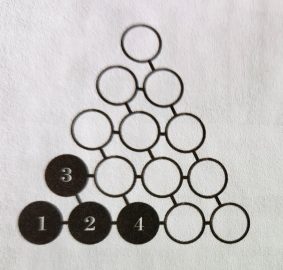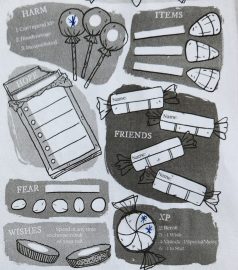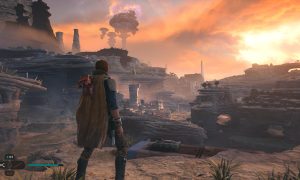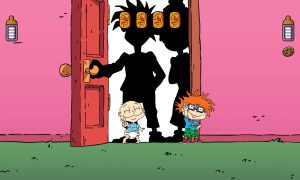This year’s TTRPG tables at GenCon showcased previously released and currently playtesting games that ran the gamut of tones and mechanics.
I am part of the small subculture of people who attend GenCon solely to play tabletop role playing games. Every year, my goal is simple: play as many new settings and systems as possible. This year did not disappoint. Before I get into the details, a quick thanks for each GM and player I sat with. The group dynamics were cohesive at a level you don’t regularly get with strangers and I left every table riding high.
You’re punks, on the moon

The Rocker playbook
Moonpunk is a Powered by the Apocalypse game with the central tenet of fighting the systems of oppression in lunar society. It incorporates the activist idea of direct action into each session — with characters earning experience at the end of sessions based on the aspects of direct action they completed. Our table dealt with musicians’ contracts getting ignored while being presented with new ones at much worse terms. Reminiscent of the Open Game License controversy that GamingTrend previously covered, we approached this problem with the same tactics: shining light on the truth and mobilizing the public to force the hand of the organization in power. This is a system that uses the backdrop of the moon to remind players of the injustices of our modern society.
As with many Powered by the Apocalypse systems, rolls are always 2d6s combined with the applicable stat. Where the system shines is the moves in each playbook. I played a Rocker, capable of Grabbing the Mic to distract NPCs away from my party. Another player was a Pilot, who was able to smuggle a bunch of gear for us to put on a massive show without corporate permission.
I most enjoyed how applicable to life the system of Moonpunk feels. Yes, I don’t expect to live on the moon but everyone could learn a thing or two about being a good activist. You should check out Moonpunk by Wannabe Games here.
America, minus the colonialism
Coyote and Crow is an alternate history world where a massive climate disaster has completely separated the Americas from the rest of the world. The Indigenous peoples there were able to thrive and develop technological advances. Our characters were convicts under the order of the courts to do rehabilitative work for the city. As part of our work, we were sent out to help a distant community with a buffalo run. Our characters struggled when a monster started hunting us, but we were urged to put the good of the distant community first. The scenario did a great job asking us to internalize the growth our characters were undergoing. Life in this world isn’t a utopia, but the way the Indigenous people treat criminals and community pushes the player to imagine one.
The dice rolls in Coyote and Crow are fun. Any given check has a DC that you roll against with a number of d12s based on your stats and your rank. Ones cancel out the highest roll; twelves count as two successes and add crit dice, giving you more potential successes for the pool. It’s a system that’s quick to determine success or failure at a glance. And I like having reasons to use something other than d6s and d20s.
Playing Coyote and Crow felt deliberate, and I mean that in the best possible sense. Everyone at the table was being respectful of the system and space, while participating in the general shenanigans that come up in every group. You should absolutely pick up this game here and check out the publisher, Coyote & Crow Games.
Seize the Means of… Magick

The skill “tree” in The Means of Magick.
The Means of Magick explores the idea of magick being a non-renewable resource, capable of being exploited just like oil. Corporations rule this world, with some obvious real-world corollaries. Your characters are gig workers, the modern day adventuring party. Ours were sent into an abandoned Presto! warehouse to locate and retrieve a powerful magickal artifact, one whose power we were not told of.
The Means of Magick requires a full set of polyhedral dice and is one of the few systems I’ve played where rolling low is more desirable. You have a number of traits which you have skills in and you use those skills to build a pyramid. For each level of the pyramid, you get to use a smaller die. That way skill checks which you are trained in tend to do less damage. That’s why you want to roll low. You almost always succeed but you take stress damage equal to your die rolls. Once you go over your limit, you have a mental break and your character–based on their background–reacts in a certain way, during and after the check.
Everyone that I know has sat at a table where someone “roleplaying” character is just themselves. I don’t think I’ve ever played a system where the fantasy and magick of the world took a backseat to the petty cruelty of the real world. I would strongly recommend checking out The Means of Magick by Wannabe Games here.
Cyberpunk Babylon
Subversion takes place in the recent past of a technologically advanced Babylon. In this caste based society, magic users sit at the pinnacle. Advances in science threaten their rule, so friction between the castes becomes inevitable. With this pressure, players are tasked with creating characters who are supposed to represent their community as emissaries to government agencies and the justice system. We were woken up to the distressing news that a community member had been assaulted and robbed. After hurrying over and stabilizing them, paramedics came to rush them to the hospital. While we started the investigation into the robbery with some clever sleuthing, we weren’t able to play the full session due to player time constraints.
Subversion allows for so much depth in character creation that we all spent more than an hour doing so. The process also includes impulses and dramatic hooks for each character, allowing the GM and player to have mechanical impacts for narrative events. The system also limits the value of a given d6 depending on your ranks in the skill. So you might get more dice for having a high stat, but if you aren’t training those skills, the die value would be capped at four (even if you rolled a six).
Cyperpunk has been done in many, many ways. It is nice to see an alternate-history futuristic setting that does it well. I regret that we had to end early and am looking forward to this game getting a full release as its Kickstarter just ended. Read more about Subversion by Fragging Unicorns Games here.
Wandering the forest forever shouldn’t be this wholesome

Part of the character sheet I used.
Babes in the Woods follows a group of children and sentient animals as they explore the woods and confront their fears. It has a slightly more sinister air than others in the genre, but is still light enough for children to play. Despite being a table full of adults, we slipped into our characters seamlessly. After finding a town in the middle of the forest, we decided to help them with their harvest festival. Along the way, characters wore gourds on their heads (or snouts), got stuck in a hay bale, and fought off crows and a demonic scarecrow. We finally completed our Grail-like quest (of finding a lost shirt), and the festival went off without a hitch.
While also a Powered by the Apocalypse system, Babes in the Woods differentiates itself mechanically by how it handles stat rolls. There are fewer stats and the concept of advantage and disadvantage, where you get an extra die and drop the lowest or highest, respectively. Add onto that different health bars for types of damage and a cleaner leveling process and you’ve got a PbtA system that feels different to every other one I’ve played.
Babes in the Woods feels like it should be scarier and darker than it is. I think the system does a good job keeping things light enough that kids could play it and I am very interested to see how a campaign of this goes. Check out Babes in the Woods by World Champ Game Co. here.
Prepare to die horribly and repeatedly
Rogue-Lite RPG is an unreleased system that lives up to its name. Right from the get go, the world makes it very clear that you will die and come back to life in a Sisyphian merry-go-round of gore. As it was a one-shot, the GM was pulling punches, so we only had a handful of characters die and not a single party wipe. With just a single session under my belt, it’s clear that this game will shine as a campaign. Taking cues from the video games of the genre, the items you find along the way are the majority of the fun. On our shopping trip into town, we grabbed a bowl of ramen at the same price as a magic sword and pooled some money together for an ice cube that was very cold. I laughed harder during this session than nearly any other session I’ve played.
Mechanically, the main interests are the decisions you make and the dice pool. Most rooms on a given floor give you the option to pick a side in a conflict, physical or social. The side you ally yourself to will then impact rooms later in the floor. There’s opportunity for a creative GM to really layer the decisions for a sprawling system of effects. As for the dice, each character has a pool of dice to use to dodge the enemy attacks or attempt to hit enemies (and a few niche things like summoning creatures). There’s actually a good amount of nuance in the decision making, which is needed for the replayability that a campaign will require.
I’ve never GMed a game and the only thing I could think of walking away from this table is how much I want to run this RPG. I look forward to each and every ridiculous iteration of this game before it gets released and hope to play it many, many times. Keep your ear to the ground at Imagining Games for updates on Rogue-Lite.
You can read more tabletop coverage for these and other games at GamingTrend tabletop.
Eric first got into tabletop playing D&D in college with a monotheistic paladin. He is currently towards the end of a six year campaign and is looking forward to the next adventure. He really enjoys one-shots at conventions and is always up for making a new group.

See below for our list of partners and affiliates:

























